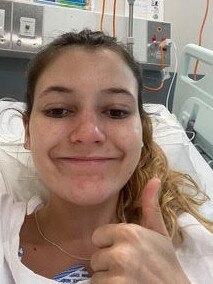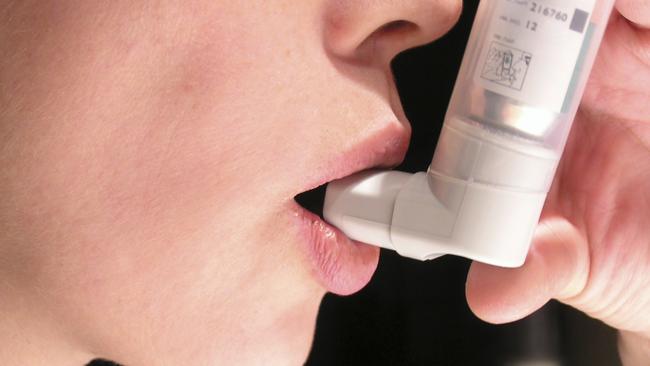Asthma research: Hunter New England Health studies the severity of attacks over the phone
NEW RESEARCH! In a first of its kind, a new study in the Hunter is looking at speech to determine the severity of an asthma attack over the phone.

Newcastle
Don't miss out on the headlines from Newcastle. Followed categories will be added to My News.
Her whole life, Caitlyn Parker has had to deal with unpredictable and severe attacks, which has constantly impacted her daily life.
As a nine-month-old baby she was diagnosed with severe eosinophilic asthma, which causes constant inflammation.


The 22-year-old from Corlette said she’s just had to learn to deal with the chronic illness, which affects one in nine Australians, or about 2.7 million people.
Fortunately for Ms Parker, in the last three years she has started on new medication, which has seen a dramatic change.
“An injection I give to myself once a month that controls the amount of eosinophils in your blood, brings your inflammation down,” she said.
“I’m still having asthma attacks but my asthma was bad all the time before having this medication, now I’ll have a flare up but it’s not consistently bad.
“I can exercise almost normally now and it doesn’t interrupt my life too much, and I can do what I want to do when I want to do it.”
Now exciting new research — right at her doorstep in the Hunter — is looking at ways to determine the severity of an asthma attack, all done over the phone.
In a first of its kind, a Hunter New England Health (HNEH) study is looking at the speech of asthmatics during an bronchospasm attack.
Similar to voice recognition technology, researchers will be able to determine the severity, simply through the changes in voice patterns.

It’s main aim is to help in emergency situations when patients are having a severe asthma attack, but could also be used as part of Telehealth to help cover a broad region like Hunter New England.
“The concept is as someone has asthma, their airways are narrowing and they bronchoconstrict, and their breathing changes,” Associate Professor John Brannan from John Hunter Hospital’s Department of Respiratory and Sleep Medicine said.
“We may be able to detect clinically relevant changes in their speech, that might in turn tell us the severity of the current state of asthma when they’re speaking.
“That’s the issue in being able to triage is determining the degree of severity.”
While past research has looked at breath sounds, the HNEH team will get down to the “nitty gritty” to understand the complete story of what a severe attack sounds like.
“In terms of speech this is probably the first,” Prof. Brannan explained.

“There has been some work done in Australia in the past on breath sounds but we’re specifically looking at the changes in speech as a result of changes in bronchospasm due to asthma.”
The study - which is now commencing recruitment of a broad range of asthmatics from across the region - will change a patient’s lung function and monitor the results.
“We’re going to analyse the same phrase before and after mild bronchospasm to look for subtle changes in speech,” he said.
“We will measure those subtle changes in hope when we use the software in the future, we will be able to predict what is actually happening in their lungs.
“Like the voice recognition technology, that will be used to set up an algorithm that will allow a way of determining this, which may be difficult for the human ear to pick up.”
Ms Parker said it’s vitally important to look for early signs of an illness, that can be potentially deadly.
“Something like that available would be really beneficial, for anyone in that situation,” she added.
“There is so much you can tell from how an asthmatics breathing sounds just over the phone and by listening.
“It can go from mild to very bad very quickly.”
The pilot research has been approved and is ready to go, with the study expected to be finalised by the end of the year for analysis of data and findings.
“It’s not a complicated study and relatively fast turn around,” Prof. Brannan said.
“Once we see something this is when the imagination can run wild.”



